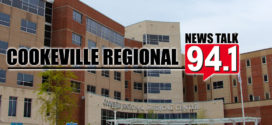Cookeville Regional Medical Center now offers on-site genetic counseling to patients through referrals.
Ashley Cohen is the Genetic Counselor at CRMC.
“For our first initial appointment with the patient, we will meet and talk about that patients personal and family history,” Cohen said. “And do a complete risk assessment to see if there might be some genetic reason for the history in the family. So for example if there is a strong family history of cancer, there might be some underlying genetic reason that is happening.”
Cohen said she and the patient will discuss genetic testing options based on the family history.
“If the patient decides to do genetic testing, which is just through a blood or saliva sample, then we will collect the sample that day,” Cohen said. “Results typically take two to four weeks to get back. And once we get those back we will have the patient come back in to talk about those results in detail.”
A genetic counselor helps prepare patients for the results of genetic testing, Cohen said.
“The easy part of genetic testing is you just spit into a tube or one tube of blood. However what is hard is actually knowing ‘do I want to know this information I can get from it,'” Cohen said. “For example for hereditary cancer testing, we might find out that a patient is at an increased risk to develop colon cancer or breast cancer. Now for some patients genetic counseling and testing is very empowering and it provides them with some answers.”
Genetic testing allows for patients to take preventative healthcare actions, Cohen said.
“The most well known and discussed genes I would probably say are the BRCA genes, the BRCA 1 and BRCA 2. And let’s say a women test positive for a broken BRCA 1 gene, we would know that she has an increased chance for breast and ovarian cancer,” Cohen said. “So at that point what we want to do is be proactive. So we would say lets talk about increase breast screenings, so mammograms and breast MRI’s, more frequently. Or even potentially talk about the possibility of a double mastectomy.”
Cohen said part of her job entails consulting insurance and payment options.
“The very good news for genetic testing is that most of the time we are able to get insurance to cover the testing for the patient. So I would say most of my patients have low to no cost for genetic testing,” Cohen said. “But the good news is too we use genetic testing laboratories that will contact the patients if there is any out of pocket cost over 100 dollars. So that way we know going in before the test is even run what that out-of-pocket cost might be for that patient.”
Genetic tests can show risk for hereditary cancers, including breast, colon and ovarian cancer. Patients can also participate in prenatal genetic screenings or screenings for cardiac-related illnesses.
 News Talk 94.1/AM 1600 Where The Upper Cumberland Talks
News Talk 94.1/AM 1600 Where The Upper Cumberland Talks








